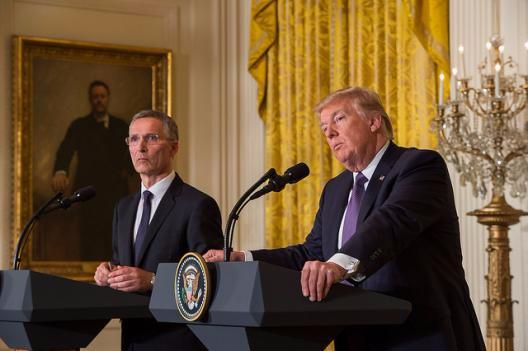 NATO is scrambling to tailor its upcoming meeting to avoid taxing President Donald Trump’s notoriously short attention span. The alliance is telling heads of state to limit talks to two to four minutes at a time during the discussion, several sources inside NATO and former senior U.S. officials tell Foreign Policy. And the alliance scrapped plans to publish the traditional full post-meeting statement meant to crystallize NATO’s latest strategic stance.
NATO is scrambling to tailor its upcoming meeting to avoid taxing President Donald Trump’s notoriously short attention span. The alliance is telling heads of state to limit talks to two to four minutes at a time during the discussion, several sources inside NATO and former senior U.S. officials tell Foreign Policy. And the alliance scrapped plans to publish the traditional full post-meeting statement meant to crystallize NATO’s latest strategic stance.
On May 25, NATO will host the heads of state of all 28 member countries in what will be Trump’s first face-to-face summit with an alliance he bashed repeatedly while running for president. NATO traditionally organizes a meeting within the first few months of a new U.S. president’s term, but Trump has the alliance more on edge than any previous newcomer, forcing organizers to look for ways to make the staid affair more engaging.
“It’s kind of ridiculous how they are preparing to deal with Trump,” said one source briefed extensively on the meeting’s preparations. “It’s like they’re preparing to deal with a child — someone with a short attention span and mood who has no knowledge of NATO, no interest in in-depth policy issues, nothing,” said the source, who spoke on condition of anonymity. “They’re freaking out….”
“Even a brief NATO summit is way too stiff, too formal, and too policy heavy for Trump. Trump is not going to like that,” said Jorge Benitez, a NATO expert with the Atlantic Council, a Washington think tank….
On the counterterrorism front, the United States is pushing NATO to formally join the counter-Islamic State coalition at the meeting, but Germany is pushing back against the idea, multiple sources tell FP. All NATO members are involved at a national level, and while the alliance supports the mission, it’s not yet a formal member of the coalition.
“Some members say it’s not necessarily the right format,” a NATO official told FP. “Since all NATO allies are already members … the question is what could we do as an alliance we are not already doing….”
Trump is also expected to push his Canadian and European allies to pony up more for defense. Burden-sharing has always been a sore spot in U.S.-NATO relations. The United States is by far the largest defense spender in the alliance — its share of NATO spending has skyrocketed in recent decades — and it has long warned other allies to bulk up their military budgets, to little avail.
“His views of burden-sharing seem to be more ambitious than past presidents,” and that could become a source of tension at the big NATO confab, said Alexander Vershbow, former deputy secretary-general of NATO. “The burden-sharing conversation may not go entirely smoothly,” he told FP.
Only five of the 28 members — the United States, United Kingdom, Poland, Estonia, and Greece — met the NATO guidelines of spending 2 percent of gross domestic product on defense, despite a more aggressive Russia and an unraveling security situation in the Middle East.
Ultimately, to keep Trump on board, NATO will probably set out to sell those recent changes as a concession to Washington, even though “98 percent of the changes NATO undertook are because of Russia, not because of Trump,” Benitez said.
That might secure Trump a happy ending to this first meeting, but could spell more trouble down the road.
“They may give Trump credit, but privately many allies feel they’re being bullied into it,” Benitez said. “Trump’s approach to NATO is poisoning the relationship.”
Image: Secretary General Jens Stoltenberg and President Donald Trump, April 12, 2017 (photo: NATO)
